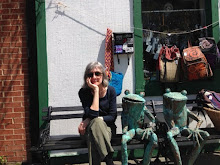The summer is usually when I begin to reflect on possible ideas for high holidays sermons. But I began this summer with a palpable sense of dread. It felt to me like this presidential election process was giving too much oxygen to the dark side of human nature. The side of human nature that turns fear into hatred and violence. And I did not want that to be the focus of my message to you.
And then I remembered that back in 2014, my sermon theme was What Can One Person Do? I felt like those sermons from 2014 expressed the essence of what I have to say about the paradox of hope and despair in difficult times.
This year my theme is Questions Worth Asking. And without being entirely conscious of it, I settled on two questions for today which end up circling back to that earlier theme.
Today’s questions echo down to us from another one of our mythic origin stories in the Torah, this time a story of murder. Cain kills his brother Abel in a fit of jealousy. God calls out to Cain: Where is Abel your brother? And Cain responds: I don’t know. Am I my brother’s keeper?
Let’s hear God’s question first: Where is your brother?
Just as we saw last week with God’s question to Adam in the garden – Where are you? – God’s question to Cain is not a geographical question. Where is your brother? is an existential question. A call to radical awareness. A call to empathy and connection.
And just as we did last week with God’s question to Adam, let’s hear this question being asked of us: Where is our brother? Even if some of us do not believe in a God who talks to us, we are not exempt from responding to the question.
God’s question to Cain is asked in the context of death, so let’s first hear the question that way, in a few scenarios from this past year in the news:
The lifeless body of Alan Kurdi, a three year old Syrian refugee, washes up on the beach in Greece – and God asks us: Where is Alan your brother?
Sharon resident Ezra Schwartz is murdered in the West Bank – and God asks us: Where is Ezra your brother?
Edward Sotomayor, Luis Omar Ocasio-Capo, Juan Ramon Guerrero, and 46 other LGBTQ people of color are killed at the Pulse nightclub in Orlando – and God asks us: Where are your brothers and sisters?
Dallas police officers Brent Thompson, Patrick Zamarripa, Michael Krol, Lorne Ahrens, and Michael Smith are ambushed while protecting a peaceful rally for racial justice – and God asks us: Where are your brothers?
Unarmed black men continue to be shot by police officers in disproportionate numbers – and God asks us: Where are your brothers?
Three or four people per day in Massachusetts alone are dying from heroin and fentanyl overdoses – and God asks us: Where are your brothers and sisters?
So far I’ve been focusing on examples of death, but we could easily generate an additional and overwhelming list of examples of people who are alive and suffering: from addiction, mental or physical illness, family conflict, systemic racism, poverty, mass incarceration, natural disasters, abuse and violence. Every day, God calls out to us: Where are your brothers and sisters?
Jewish tradition is clear in its moral imperative that we see every human being as precious and deserving of dignity, justice, and life. And our tradition recognizes that suffering and violence have been a part of the human experience from the very beginning. God’s question to Cain – and therefore to us – is a call to radical awareness. A call to empathy and connection.
Cain’s first response to God is “I don’t know,” which we can hear as a complete denial of connection. A refusal of awareness. I think that for us, the situation is somewhat different. While there may be some denial on our part, some willful refusal to be aware of the suffering of others, I think we struggle more with too much awareness. It seems to me that we are not equipped to sustain empathy and a sense of moral outrage on behalf of the untold numbers of people who are suffering and dying every day. It is a new phenomenon for the human brain to have 24/7 access to so much information about human suffering, and it is far from clear that our internal wiring can handle the avalanche of input we are receiving.
And so the question calls out to us, day after day: Where is your brother? And sometimes we may just feel like answering: I don’t know. Am I my brother’s keeper?
So let’s consider that second question. The Hebrew word for keeper, shomer, has the connotation of being a guardian. Someone who sits beside the body of a recently deceased person is called a shomer. Someone who stands guard outside the door when a newly married couple spend a few minutes alone is also called a shomer.
We also refer to God as Shomer Yisrael, Guardian of the Jewish people. Calling God our Shomer, our guardian, expresses the yearning we have to be protected, to be lovingly watched over. And just as we yearn for a cosmic guardian, we are instructed to be that guardian for one another. Because what are the qualities we attribute to God, if not our own deepest human aspirations?
But how do we act on that aspiration, when we are simultaneously bombarded with information about global human suffering and increasingly isolated from one another?
(end of part one)
